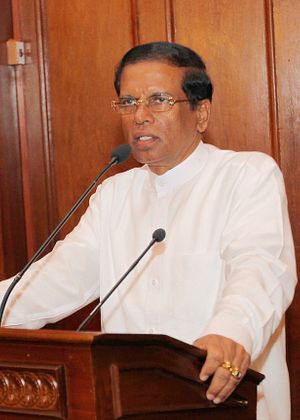Sri Lanka recently witnessed a hunger strike by more than 200 Tamil political prisoners across the country (who were demanding that they be released). The strike lasted for about a week and has now ended. Evidently the prisoners have been promised by President Maithripala Sirisena (in writing) that he will deal with this issue by November 7. However, what happens next remains unclear. Would Sirisena really allow these prisoners to be released?
A range of people and groups (both on the island and abroad) have been demanding that the Prevention of Terrorism Act (PTA) be repealed for quite some time. The legislation gives the country’s state security personnel wide-ranging authority to search, arrest and detain people; without a doubt, the law has had a disproportionately negative effect on the nation’s Tamil community. Realistically speaking, it’s unlikely that the PTA would be repealed in the near future, even with Mahinda Rajapaksa – the previous president whose decade in power was plagued by authoritarianism, corruption and nepotism – no longer running the country.
Though the country’s numerical minorities voted overwhelmingly for Sirisena during January’s presidential election, Sirisena’s campaign platform dealt mostly with curbing corruption, improving governance and trying to return the country to a parliamentary democracy.
When and how will Sirisena move on other (arguably more controversial) war-related matters that are of particular importance to the country’s Tamil community?
From the military’s occupation of civilian land in the northern province to the government’s continued detention of Tamil political prisoners (many of whom haven’t even been charged), Sri Lanka’s coalition government could be doing more to heal the wounds of war.
To make matters worse, we have Sri Lanka’s Minister of Justice recently saying that Sri Lanka doesn’t have any political prisoners.
Last month at the UN Human Rights Council, Mangala Samaraweera, Sri Lanka’s foreign minister, spoke eloquently about how the country had entered a new era. He talked about “ensuring that the universal values of equality, justice, and freedom are upheld by fostering reconciliation between communities and securing a political settlement.”
Even a month after reading the speech, this part still grabs me:
Those who are sceptical about Sri Lanka’s ability to transform as a nation, and address all these issues, are many. They claim that there can never be justice in Sri Lanka; that there can never be recognition of all communities as equals. All I have to say to them is: look at what the people achieved on the 8th of January. The world had given up hope on Sri Lanka to such an extent that very few believed that what was achieved through democratic means on that day was within the realm of possibility in my country. This feat was repeated on the 17th of August when extremists on both sides of the divide failed to secure seats in Parliament. Therefore, I say to the sceptics: don’t judge us by the broken promises, experiences and u-turns of the past. Let us design, define and create our future by our hopes and aspirations, and not be held back by the fears and prejudices of the past. Let us not be afraid to dream. Let us not be afraid to engage in meaningful dialogue aimed at finding solutions to problems as opposed to pointing fingers, heaping blame and scoring political points at the expense of future generations.
Sirisena’s decision on Tamil political prisoners in the weeks ahead is something to watch closely.































